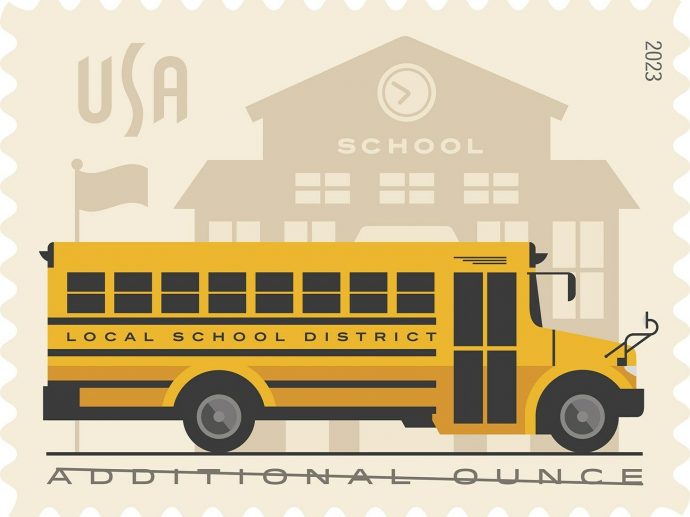Categories more
- Adventures (17)
- Arts / Collectables (15)
- Automotive (37)
- Aviation (11)
- Bath, Body, & Health (77)
- Children (6)
- Cigars / Spirits (32)
- Cuisine (16)
- Design/Architecture (22)
- Electronics (13)
- Entertainment (4)
- Event Planning (5)
- Fashion (46)
- Finance (9)
- Gifts / Misc (6)
- Home Decor (45)
- Jewelry (41)
- Pets (3)
- Philanthropy (1)
- Real Estate (16)
- Services (23)
- Sports / Golf (14)
- Vacation / Travel (60)
- Watches / Pens (15)
- Wines / Vines (24)
- Yachting / Boating (17)
Published
02/05/2023 by U.S. Postal ServiceWhether it inspires excitement, tears, fears or nostalgia, the bright yellow bus that transports millions of students to classrooms across the United States every day is a cherished artifact of a common childhood experience. With the release of the School Bus additional ounce stamp, the U.S. Postal Service celebrates the iconic yellow school bus and its place in the nation's collective childhood.
About 25 million children across the United States ride a yellow bus to school every day. In addition to providing safe and reliable transportation — almost 70 times safer than being driven to school in a car—these buses also keep millions of cars off the road, saving gasoline and lowering carbon dioxide emissions. Inside each bus is a rolling microcosm: a youthful world where childish joys and dramas play out, friendships form and dissolve, and daydreams are dreamed as children are ferried to and from school.
The stamp's background is ecru, while the school, flag, and lettering are tan. The school building's few details — windows, door, clock face, and "SCHOOL" lettering — are also ecru. The body of the bus is bright yellow, its tire rims are gray, and its tires, door, windows, bumpers, trim, and details are black. In addition, black lettering on its side states "LOCAL SCHOOL DISTRICT." The bus stands on a thick black line that serves both as a road and a border separating it from the words "ADDITIONAL OUNCE" along the stamp's bottom edge.
Artist Steve Wolf worked with art director Greg Breeding and designer Mike Ryan to create this stamp.
School Bus additional ounce stamps are issued in panes of 20 and coils of 100. Additional ounce stamps are used to add postage when needed on heavier mailpieces. Like a Forever® stamp, this stamp will always be valid for the rate printed on it.
Background
The brilliant color of school buses is no accident. In 1939, a group of state transportation officials and bus and paint manufacturers gathered at Columbia University's Teachers College, in New York City, to develop safety and fabrication standards for school buses. The group tested various colors and determined that black lettering showed most legibly on the vibrant "National School Bus Chrome," which became the vehicle's standard color. Thirty-five states immediately began mandating that color, but it was not until 1974 that all states adopted the shade.















